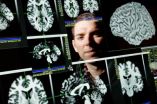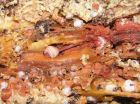Helping healthy cells could be key to fighting leukemia, research suggests
2013-01-23
(Press-News.org) Researchers at Imperial College London have shown that keeping healthy blood cells alive could be a more important tool in the fight against leukaemia than keeping cancerous cells at bay.
The team used computer modelling to show that maintaining a friendly environment for healthy cells was more effective than targeting the damaged cells directly. This result could change the way leukaemia is treated, as cancer treatment has traditionally relied on fighting disease rather than maintaining health.
A better understanding of the processes taking place in the bone marrow could therefore allow doctors to take earlier and more targeted action in combating leukaemia.
A cancer of the blood, leukaemia is thought to survive and grow through the action of leukaemia stem cells (LSCs), which multiply within the bone marrow. Here they face competition for resources with haematopoietic stem cells (or HSCs), which are responsible for producing and maintaining all the different varieties of healthy blood cell within the body.
The paper, published in the Journal of the Royal Society Interface today, is the first attempt to model competition between these two types of cells using methods borrowed from the world of ecology.
Lead author Adam MacLean said: "The first researchers to model competing populations mathematically were looking at predators and prey - famously lynx hunting wild hares. Whilst we don't have predator and prey cells, we have two cellular species who directly compete against each other for resources, and our models analyse how that competition plays out within the biological niche of the bone marrow."
The team carried out computer simulations to find conditions that would result in vanishing numbers of leukaemia cells. They found that the greatest chance of beating leukaemia came from maintaining a healthy population of HSCs, rather than trying to eradicate the LSCs directly.
According to Michael Stumpf, Professor of Theoretical Systems Biology and one of the paper's co-authors, "maintaining health is more likely to eradicate leukaemia than fighting leukaemia directly without taking care of the healthy stem cells. And that's a slightly surprising result which nobody had explicitly stated before. It allows us to understand these processes in a way that could be important for potential therapeutic responses."
Thanks to a recent funding grant from blood cancer charity Leukaemia & Lymphoma Research, Dr Lo Celso and her team hope to refine the models outlined in the paper to more accurately simulate conditions in the human body.
Professor Stumpf added: "We want to make the model more useful, and find cases where we can break the model if it's incorrect. Its simplicity means that it's fairly robust, but we hope to reproduce the real complexity of the competition between HSCs and LSCs."
### END
ELSE PRESS RELEASES FROM THIS DATE:
2013-01-23
Children with eczema have a more diverse set of bacteria in their guts than non affected children, finds a new study in BioMed Central's open access journal BMC Microbiology. The types of bacteria present were also more typical of adult gut microbes than for toddlers without eczema.
Eczema is a chronic inflammation of the epidermis. The gut bacteria of children with or without eczema was examined when they were six and 18 months old. At six months all the infants had the same types of bacteria but by 18 months old the children with eczema had more of a type of bacteria ...
2013-01-23
The metabolic process which fuels the growth of many cancers has its origins in normal brain growth finds a new study published in BioMed Central's open access journal Cancer & Metabolism. Using knock-out mice the study shows that interfering with Hexokinase-2 (Hk2), an enzyme integral to glucose metabolism, reduces the aggressiveness of medulloblastoma, the most common malignant brain tumor in children, and allows long term survival of mice.
Most cells only convert glucose to lactate in the absence of oxygen, for example, during a short burst of intensive exercise (anaerobic ...
2013-01-23
Antidepressant prescriptions in the UK have increased by 9.6% in 2011, to 46 million prescriptions. Does this reflect overmedicalisation or appropriate treatment? Two experts debate the issue on bmj.com today.
Glasgow GP, Dr Des Spence, thinks that "we use antidepressants too easily, for too long, and that they are effective for few people (if at all)"
He acknowledges that depression is an important illness, but argues that the current definition of clinical depression (two weeks of low mood – even after bereavement) "is too loose and is causing widespread medicalisation." ...
2013-01-23
First pregnancies complicated by postpartum haemorrhage (PPH) have no detrimental effect on future fertility but women who have caesarean sections at the time of PPH are less likely to conceive again, finds a new study published today (23 January) in BJOG: An International Journal of Obstetrics and Gynaecology.
There has been a rise in the overall rate of PPH (where blood loss is >500ml) in the UK, due to increases in maternal risk factors and in the number of caesarean sections performed. Women who undergo caesarean section deliveries are more likely to suffer PPH than ...
2013-01-23
UNIVERSITY PARK, Pa. -- Forging public and private partnerships that encourage broadband access for people with disabilities may help bridge a technological divide that hinders them from reaching their potential, according to an international team of researchers.
Besides connecting people who have disabilities with resources that may help them become more independent, equipping them with broadband technology can also benefit society and ease the financial burden on taxpayers, said Krishna Jayakar, associate professor of communications, Penn State.
"The benefits of bridging ...
2013-01-23
Databriefing: How long can we expect to live?
An article from John Appleby, Chief Economist at the Kings Fund, published on bmj.com today brings attention to the rising amount of those expected to live to 100 and asks where it will end.
According to the Office of National Statistics there seems to be "no end in sight" as far as the number of UK citizens reaching 100 years old is concerned. Approximately 13% of girls born in 1951 are expected to reach this milestone, increasing to 40% for girls born this year and a predicted 60% of those born in 2060.
Appleby attributes ...
2013-01-23
CHAMPAIGN, Ill. — A new study of 152 Vietnam veterans with combat-related brain injuries offers the first detailed map of the brain regions that contribute to emotional intelligence – the ability to process emotional information and navigate the social world.
The study found significant overlap between general intelligence and emotional intelligence, both in terms of behavior and in the brain. Higher scores on general intelligence tests corresponded significantly with higher performance on measures of emotional intelligence, and many of the same brain regions were found ...
2013-01-23
This press release is available in German.Trees do not grow in the deep sea, nevertheless sunken pieces of wood can develop into oases for deep-sea life - at least temporarily until the wood is fully degraded. A team of Max Planck researchers from Germany now showed how sunken wood can develop into attractive habitats for a variety of microorganisms and invertebrates. By using underwater robot technology, they confirmed their hypothesis that animals from hot and cold seeps would be attracted to the wood due to the activity of bacteria, which produce hydrogen sulfide during ...
2013-01-23
ST. LOUIS -- In research published in the Jan. 21 issue of The Journal of Cell Biology, a team led by Susana Gonzalo, Ph.D., assistant professor of biochemistry and molecular biology at Saint Louis University, has discovered a molecular pathway that contributes to triple-negative breast cancer, an often deadly and treatment resistant form of cancer that tends to strike younger women. In addition, Gonzalo and her team identified vitamin D and some protease inhibitors as possible new therapies and discovered a set of three biomarkers that can help to identify patients who ...
2013-01-23
Public campaigns that call upon people to think and act interdependently may undermine motivation for many Americans, according to new research published in Psychological Science, a journal of the Association for Psychological Science.
Americans are repeatedly exposed to messages urging them to think and act with others in mind, telling us, for example, to act sustainably by bringing reusable bags to the grocery store or to act responsibly by getting a flu shot. Researchers MarYam Hamedani, Hazel Rose Markus, and Alyssa Fu of Stanford University wondered what impact these ...
LAST 30 PRESS RELEASES:
[Press-News.org] Helping healthy cells could be key to fighting leukemia, research suggests

